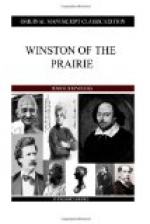The girl’s face was partly in shadow, and her figure foreshortened by her pose, which accentuated its rounded outline and concealed its willowy slenderness; but the broad white forehead and straight nose became visible when she moved her head a trifle, and a faintly humorous sparkle crept into the clear brown eyes. Possibly Maud Barrington looked her best just then, for the lower part of the pale-tinted face was a trifle too firm in its modeling.
“No, I am not tired, aunt, and I could not sleep just now,” she said. “You see, after leaving all that behind one, one feels, as it were, adrift, and it is necessary to realize one’s self again.”
The little silver-haired lady who sat in the big basket chair smiled down upon her, and laid a thin white hand that was still beautiful upon the gleaming hair.
“I can understand, my dear, and am glad you enjoyed your stay in the city, because sometimes when I count your birthdays I can’t help a fancy that you are not young enough,” she said. “You have lived out here with two old people who belong to the past too much.”
The girl moved a little, and swept her glance slowly round the room. It was small and scantily furnished, though great curtains shrouded door and window, and here and there a picture relieved the bareness of the walls, which were paneled with roughly-dressed British-Columbian cedar. The floor was of redwood diligently polished, and adorned, not covered, by one or two skins brought by some of Colonel Barrington’s younger neighbors from the Rockies. There were two basket chairs and a plain redwood table; but in contrast to them a cabinet of old French workmanship stood in one corner bearing books in dainty bindings, and two great silver candlesticks. The shaded lamp was also of the same metal, and the whole room with its faint resinous smell conveyed, in a fashion not uncommon on the prairie, a suggestion of taste and refinement held in check by at least comparative poverty. Colonel Barrington was a widower who had been esteemed a man of wealth, but the founding of Silverdale had made a serious inroad on his finances. Even yet, though he occasionally practiced it, he did not take kindly to economy.
“Yes,” said the girl, “I enjoyed it all—and it was so different from the prairie.”
There was comprehension, and a trace of sympathy, in Miss Barrington’s nod. “Tell me a little, my dear,” she said. “There was not a great deal about it in your letters.”
Her niece glanced dreamily into the sinking fire as though she would call up the pictures there. “But you know it all—the life I have only had glimpses of. Well, for the first few months I almost lost my head, and was swung right off my feet by the whirl of it. It was then I was, perhaps, just a trifle thoughtless.”
The white-haired lady laughed softly. “It is difficult to believe it, Maud.”




